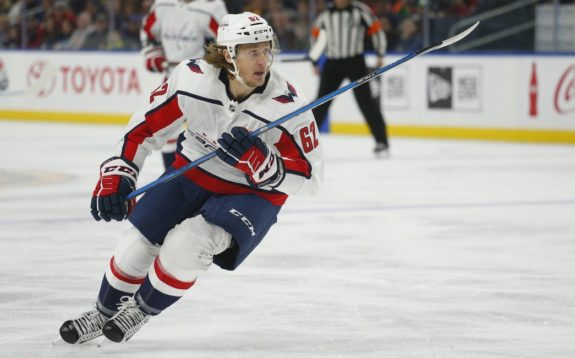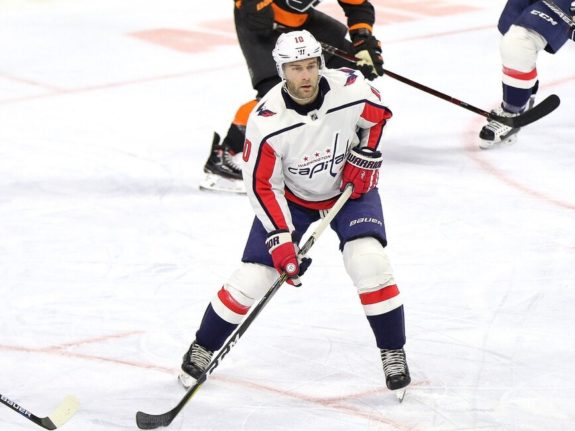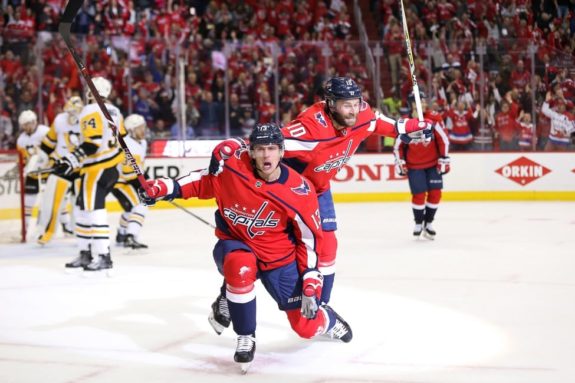
Less than a week into the NHL offseason, Washington Capitals fans should have an idea of how their offseason will shape up. General manager Brian MacLellan secured a key piece of the Caps roster Sunday afternoon when he re-signed Swedish forward Carl Hagelin to a contract extension worth $11 million over four years.

A journeyman, Hagelin has suited up for five teams in his seven seasons of NHL play, including three in the 2018-19 season alone. The Capitals traded for him in a deadline deal after he played a brief stint with the Los Angeles Kings, who received him from the Pittsburgh Penguins. Hagelin’s production improved in head coach Todd Reirden’s system, as he notched three goals and eight assists in 20 regular-season games in red and blue. He found an especially important role on the penalty kill, averaging 2:11 per game, the most on the roster.
While Hagelin was held off the scoreboard in the Capitals’ seven-game, first-round loss to the Carolina Hurricanes, aside from an assist on Evgeny Kuznetzov’s goal in Game 7, there must have been something that MacLellan saw in him during the regular season that forced his hand.
The problem? In an echo of re-signing Tom Wilson 11 months ago, MacLellan may have given away too much of their cap space on one contract.
Scraping Together a Team
Assuming the salary cap will peak at the previously-estimated $83 million – and rumors now suggest it may be slightly less – the Hagelin contract will leave the Capitals with $10.7 million under the ceiling, barely enough to add one or two free agent contracts. This puts the team right back where they started the offseason, up against the cap wall and in need of a quick deal such as the Matt Niskanen-Radko Gudas trade in order to free up cash.
Unfortunately, there aren’t many players left that fill Niskanen’s place in the Venn diagram of players with high-priced contracts: no longer as useful to the organization as they once were, but could fill a niche somewhere else. Unless MacLellan comes up with a similar trade later in the offseason, some key players could jump ship in search of better contracts, including Brett Connolly and Jakub Vrana. Both players had breakout seasons in 2018-19 and neither have a deal in place for 2019-20.

Connolly achieved personal bests in every significant offensive category, while Vrana notched a career-high 24 goals. While Vrana is a restricted free agent, and the only issue MacLellan has with him at the moment is which kind of deal to offer him, they have no such luxury with Connolly, who is a 27-year-old unrestricted free agent and will likely be a hot commodity on the open market.
Hagelin, on the other hand, is 31 and may already have passed the peak of an NHL career that saw him win two Stanley Cups with the Penguins and appear in another Stanley Cup Final with the New York Rangers. While his performance improved toward the end of 2018-19, a 20-game sample makes it hard to tell whether his run of good form was a sign of things to come or merely a fluke.
Hagelin Overpaid?
While Hagelin could be of use to the Capitals as a third or fourth-line defender and penalty kill specialist, and his competency at those positions has already been showcased, the decision to throw $11 million at such a player has to be questioned when the signing fails to address their major weakness: lack of offensive depth.
That weakness came back to bite the Capitals in their postseason loss to the Hurricanes. Of the 20 goals they scored in the seven-game series, the bottom-six forwards scored only five, one an empty-netter. Incidentally, Connolly – one of the Capitals’ most prominent unsigned players – scored two of the other goals.

However, the facts are laid out: Hagelin has a contract, Connolly and Vrana do not, and may not get one. Though the deal lasts four years, Hagelin may only have the first – if even that long – to prove to the Capitals faithful that MacLellan’s faith in him was not unfounded.